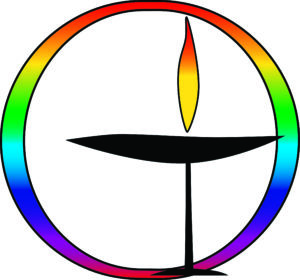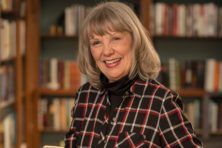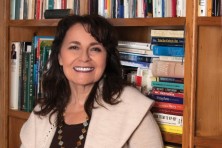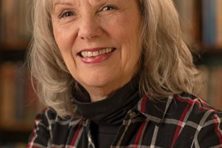Ephraim Poetry Series Welcomes Wisconsin Poet Laureate June 14
- Share
- Tweet
- Pin
- Share
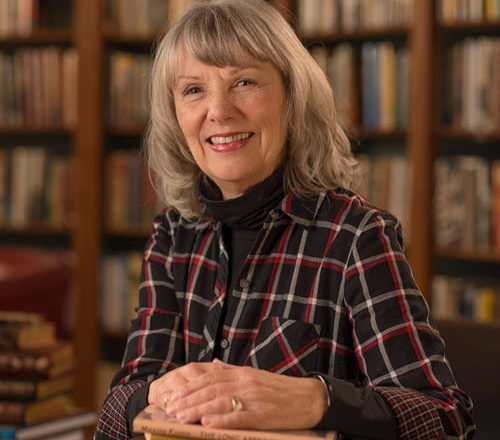
On June 14, the Unitarian Universalist Fellowship of Door County will set the stage for a poetry reading by 2017-18 Wisconsin Poet Laureate Karla Huston.
Huston has been part of the Wisconsin poetry scene since the mid ‘90s, gaining a reputation for a body of work that is elegant, imaginative and humorous. Ronnie Hess, the chair of the Wisconsin Poet Laureate Commission, praised Huston for her “rare ability to tackle just about any issue—large or small—and plumb its meaning for us, telling us why we should care. Her words are lustrous and luminous, fairly gliding off the page while also carrying a powerful, unforgettable punch.”
Huston is author of eight poetry chapbooks and a Pushcart Prize winner for her poem, “A Theory of Lipstick.” Along with giving readings at conferences and festivals across the state, Huston will work to nurture poetry reading and writing among the state’s elderly and memory impaired as part of the Memory Café movement, a project of the Alzheimer’s & Dementia Alliance of Wisconsin.
I recently caught up with Huston to talk about open mic readings contemporary poetry and the role of women in poetry today.
Huston will read selections of her poetry at this month’s Dickinson Poetry Series at the Unitarian Universalist Fellowship of Door County. The free reading begins at 7 pm on Wednesday, June 14 and will be followed by an open mic and reception. The Unitarian Universalist Fellowship is located at 10341 Hwy. 42 in Ephraim. For more information call 920.854.7559.
Alyssa Skiba (AS): Why do you think community poetry readings are so important?
Karla Huston (KH): First of all, you would be surprised how many people write poetry and haven’t admitted to it. When you’re a poet, you’re sometimes looked at as the odd duck of literature because there is no such thing as a well-known poet or a rich poet. I started going to the local readings back in the ‘90s myself, scared to death, but two things came as a result of it: I gained a tremendous number of friends, local people are so welcoming and so friendly, and I also learned a great deal about writing by listening to other people’s poetry. To be able to sit and listen and have a few moments, poetry requires a different kind of concentration than, say, reading fiction. You learn about how someone else might put a poem together. I learned a great deal about my own writing by attending those events. The other reason why I think they’re so important is writing is a very solitary activity where you do it alone, you stare at the computer screen or that blank sheet of paper, and it’s nice to know somebody else is going through the same kind of process. It’s like, oh my god, I’m not alone!
AS: What’s your best advice on writing poetry?
KH: The library is your best friend. You have all these free books of poetry that you can take out and find. If you like a couple of poems from this poet and maybe you don’t want to check the book out but if you find a lot that you like, take the book home and read it like a writer, don’t read it like a reader. It’s a whole different way of reading when you’re a writing and you’re looking to see how something is constructed rather than reading it just for the enjoyment or the pleasure of the story or the experience…Reading is one of the best ways to learn to write. Reading for me is also inspiration. Sometimes when I read a particular author and I read something that just trips the trigger, the writer trigger in my brain, I put the book down and go and write something. So if I get stuck, I pick up a book and read it.
AS: Who are your favorite contemporary poets?
KH: I have always liked the poetry of Dorianne Laux because initially I liked her female perspective on the world and I also love the way she puts words together. I learned a lot about using sound and rhythm without rhyming but the sounds of words in poems from her. She also writes narrative poems better than almost anybody, and those are poems that tell a story, and how she can go from Point A to Point B and you’re just taken along for the ride and her work is always, to me, stunning. Another poet whose work I always admired is Ted Kooser. He, to me, is the king of the single metaphor. He can take an image and a thing, for example, and create something surprising and wonderful probably better than anybody…I like poetry that speaks to me, that maybe resonates with my experience or my perspective.
AS: Is there anything happening in the poetry world today that really excites you?
KH: As far as poetry journals, maybe 10 years ago poetry journals online were not very good in the selection of poems. Running a poetry journal is a labor of love because everybody wants to be published and nobody wants to subscribe to the journal so you end up having to set aside a lot of money to do it. Now with some journals being published online, you can do it relatively inexpensively. I think that you reach a wider audience when you are publishing online…I think online publishing is very exciting and there are some wonderful publishers in the state of Wisconsin. One of them, for example, Cristina Norcross from the Oconomowoc area, she’s a wonderful poet herself but she has about a year ago started a journal called the Blue Heron Review, which I think is A, courageous to start a journal and B, particularly a journal publishing as a woman because I don’t think you see as many women publishers as men. She has taken on this labor of love and putting this online journal together. I’m very excited about people who are taking this step and going online and I’m very excited to see more women stepping into the fray and publishing.
AS: Why do you think women are having a greater presence in the poetry world today?
KH: I know that often in the past, women’s poetry has been seen as too domestic with subjects that concerned the hearth and the home. The big, powerful critics deemed it not worthy or not as good but I think that women have just persevered and they’re going to tell their story. I think that’s part of the process of writing is you’re going to tell your story in the best way you can and if people like it, they like it and if they don’t, they don’t. I think you’re seeing more women enrolled in particularly graduate level writing programs nowadays. The graduate writing system in this country is turning out a lot of writers and I think many women are enrolled in those programs and graduating from those programs. I think that there is a wider audience maybe than there has been in the past although maybe if you talk to most people they’ll tell you that the only people reading poetry are other poets and that’s probably true too. But I think people, whether they’re writing fiction or nonfiction or poetry, they have something they want to say and they are going to say it and I think that if someone reads it, yahoo for them but I don’t think that a lack of readership is keeping people from writing.
AS: What role does poetry have in the world today?
KH: Not much. Poetry is art for art’s sake and it’s often not read and not given very much regard and sometimes snickered at but those are usually by people who don’t read it and don’t appreciate it. However, poetry seems to sneak up on people when there’s an important occasion – a wedding, a funeral, a celebration of sort, or when there are times of war and strife in the country, not just our country but all over the world, poetry then somehow becomes very necessary. I think that’s one of the powers of poetry because it has the ability to say what is very hard to say sometimes and people look to it for its ability to be able to do that.
AS: What’s your best writing advice?
KH: The library is your best friend. You have all these free books of poetry that you can take out and find. If you like a couple of poems from this poet and maybe you don’t want to check the book out but if you find a lot that you like, take the book home and read it like a writer, don’t read it like a reader. It’s a whole different way of reading when you’re a writing and you’re looking to see how something is constructed rather than reading it just for the enjoyment or the pleasure of the story or the experience…Reading for me is also inspiration. Sometimes when I read a particular author and I read something that just trips the trigger, the writer trigger in my brain, I put the book down and go and write something. So if I get stuck, I pick up a book and read it.
LAKES IN WISCONSIN
by Karla Huston
They’ve been pressed into the earth
by the rocky thumbs of glaciers,
the ice pulled back, leaving
its meltings behind, leaving kettles
and moraines and riots of rocks.
In Wisconsin, there are 59 lakes
named Long Lake, sometimes two
in a county. There are 82 named Bass
which might or might not be jumping
with them, and 116 named Mud.
In Wisconsin we boast that we have
more lakes than Minnesota
which mentions 10,000. It all
depends on how you define a lake.
In Wisconsin, we define a lake
as something more than a finger’s width
deep—like the lake of your bird bath,
the lake in your dog’s water dish
or the wet pools of your eyes.

